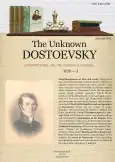“My Husband’s Lifelong Dream Was for Our Children to Get an Education…”: Gymnasium Students Lyuba and Fedya Dostoevsky
- Authors: Dostoevsky A.D., Shwarts N.V.
- Issue: Vol 7, No 2 (2020)
- Pages: 196-218
- Section: Articles
- URL: https://journal-vniispk.ru/2409-5788/article/view/286985
- DOI: https://doi.org/10.15393/j10.art.2020.4701
- ID: 286985
Cite item
Full Text
Abstract
Dostoevsky’s main concern was to educate his children, Lyuba and Fedya. After the writer’s death, this desire was realized by his widow Anna Grigoryevna. Little was known about the education of Dostoevsky’s children, primarily from memoirs (penned by Anna and Lyubov Dostoevsky, Anna Ostroumova). The article presents previously unknown documents from the Central State Historical Archive of Saint Petersburg (name books, personal statements, etc.), containing information about the education of F. M. Dostoevsky’s children: Lyuba — at the Foundry Gymnasium, Fedya — at the F. F. Bychkov Gymnasium (purchased by Ya. Gurevich in 1883). Letters related to the education of Dostoevsky’s children were introduced into scientific circulation: Lyuba’s and Fedya’s to their mother, teacher V. Ivanova’s to A. G. Dostoevskaya. In the course of commenting on archival documents, the author emphasizes the continuity between home education and the education of the writer and his children, and reveals the role of A. G. Dostoevskaya in fulfilling Fedor Mikhailovich’s dream: to provide them with a quality education. Home education, first and foremost, the established tradition of family reading, which the Dostoevskys always heeded great attention to, allowed Lyuba to enter the gymnasium at the age of thirteen, bypassing two primary classes, and successfully reach the second, pre-graduation, class. Her classmates were A. P. Ostroumova (Lebedeva) and N. Ya. Polonskaya (Yelachich), who later became famous figures in Russian history. The education received at the gymnasium helped the writer’s daughter to prove herself in literature during the years in emigration, to become a Russian writer in Italy, to represent the legacy of Dostoevsky in Europe, and to successfully conduct educational and cultural activities in Italy. The writer’s son Fedya, who studied at the St. Petersburg F. F. Bychkov Gymnasium in 1882–1889, entered the law faculty of the St. Petersburg Imperial University in 1890, became interested in horse breeding, and in the latter years of his life paid great attention to the preservation of his father’s handwritten heritage. Thus, the children of F. M. Dostoevsky fulfilled his legacy: “Do not forget to study, both of you”.
About the authors
Alexey D. Dostoevsky
Email: adostoevsky@mail.ru
Independent Researcher, Great-Great-Grandson of
F. M. Dostoevsky
Natalia V. Shwarts
Author for correspondence.
Email: nshwartz@list.ru
Independent Researcher, Secretary of the Russian Dostoevsky Society
Russian Federation, Saint PetersburgReferences
- Andrianova I. S. Muzey pamyati F. M. Dostoevskogo»: istoriya i perspektivy proekta [“The Museum of Memory of F. M. Dostoevsky”: History and the Prospects of the Project]. Petrozavodsk, Petrozavodsk State University Publ., 2013. 192 p. (In Russ.)
- Belov S. V. F. M. Dostoevskiy i ego okruzhenie: entsiklopedicheskiy slovar’: v 2 tomakh [F. M. Dostoevsky and His Ambience: Encyclopedic Dictionary: in 2 Vols]. St. Petersburg, Aleteyya Publ., 2001. (In Russ.)
- Biblioteka F. M. Dostoevskogo: opyt rekonstruktsii. Nauchnoe opisanie [F. M. Dostoevsky’s Library: The Experiment of Reconstruction. Scientific Description]. St. Petersburg, Nauka Publ., 2001. 338 p. (In Russ.)
- Boguslavskiy M. V. XX vek rossiyskogo obrazovaniya [The 20th Century of Russian Education]. Moscow, Per se Publ., 2002. 319 p. (In Russ.)
- Dostoevskaya A. G. Vospominaniya. 1846−1917 [Memoirs. 1846–1917]. Moscow, Boslen Publ., 2015. 768 p. (In Russ.)
- Dostoevskaya L. F. Dostoevkiy v izobrazhenii ego docheri L. Dostoevkoy [Dostoevsky in the Image of His Daughter L. Dostoevskaya]. Moscow, Petrograd, State Publishing House Publ., 1922. 105 p. (In Russ.)
- Dostoevskaya L. F. Moy otets Fedor Dostoevskiy [My Father Fedor Dostoevsky]. Moscow, Boslen Publ., 2017. 512 p. (In Russ.)
- Dostoevskiy D. А. Dostoevskies in the XX Century. In: Dostoevskiy i XX vek: v 2 tomakh [Dostoevsky and the 20th Сentury: in 2 Vols]. Moscow, A. M. Gorky Institute of World Literature of the Russian Academy of Sciences Publ., 2007, vol. 1, pp. 560–585. (In Russ.)
- Dostoevskiy F. M. Polnoe sobranie sochineniy: v 30 tomakh [The Complete Works: in 30 Vols]. Leningrad, Nauka Publ., 1972–1990. (In Russ.)
- Ostroumova-Lebedeva A. A. Avtobiograficheskie zapiski [Autobiographical Notes]. Moscow, Izobrazitel’noe iskusstvo Publ., 1974. 491 p. (In Russ.)
- Panyukova T. V. Archives of St. Petersburg as a Source of Unknown Biographical Information About F. M. Dostoevsky’s Environment. In: Tvorchestvo F. M. Dostoevskogo: problem, zhanry, interpretatsii [Dostoevsky’s Work: Problems, Genres, Interpretations]. Novokuznetsk, Krasnoyarsk, Sitall Publ., vol. 28, issue 12, pp. 8–18. (In Russ.)
- Talalay M. Rossiyskiy nekropol’ v Italii [Russian Necropolis in Italy]. Мoscow, Staraya Basmannaya Publ., 2014. 908 p. (In Russ.)
- Dostoevskaya L. F. Dostoyewski geschildert von seiner Tochter A[imée] Dostoyewski [Dostoevsky Described by His Daughter A[imée] Dostoevsky]. München, Ernst Reinhardt Verlag Publ., 1920. 307 p. (In German)
Supplementary files










